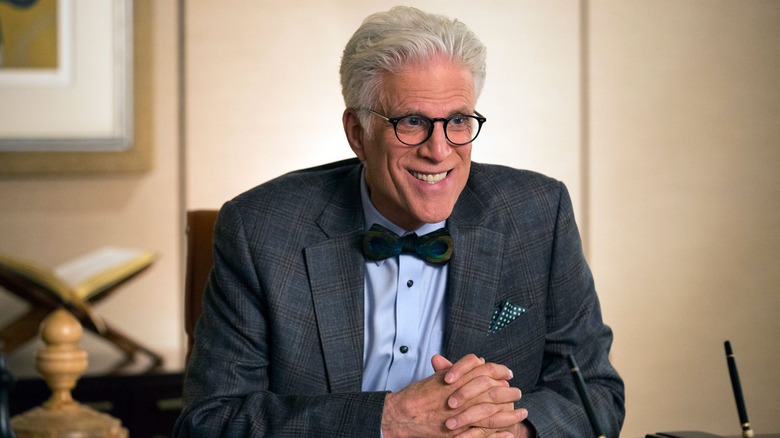
NBC's afterlife comedy "The Good Place" may be one of the most nuanced and empathetic looks at humanity ever put to television, and the series was fortunately given the opportunity to complete the story and end on their own terms. Viewers fell in love with the four lost souls destined to suffer for all eternity, the squid demon from hell/neighborhood architect in charge of their fate, and his not-a-girl assistant Janet — which made saying goodbye all the more difficult.
Jason (Manny Jacinto), Chidi (Jackson Harper), and Eleanor (Kristen Bell) chose to bid farewell to paradise and disappear into nothingness, Tahani (Jameela Jamil) chose to stay behind and work her way to becoming an afterlife architect, Janet (D'Arcy Carden) continued her role as the ultimate assistant, and the demonic Michael (Ted Danson) opted for a mortal life on Earth to finally truly experience what it means to be human with no guarantee that upon his death he'd be able to re-enter the titular Good Place.
What Is The Good Place?
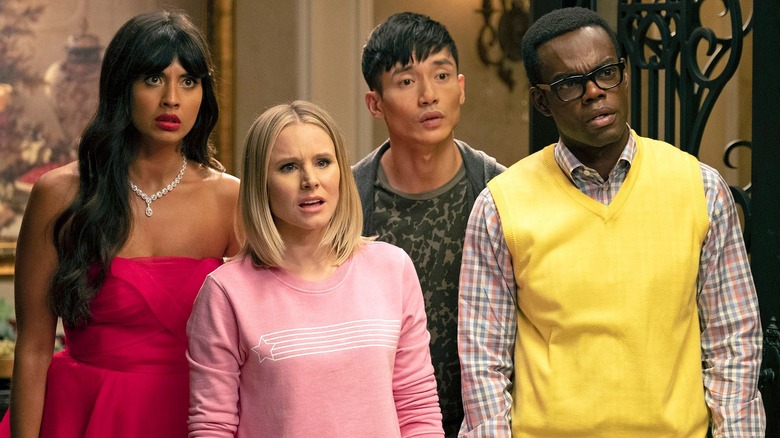
Premiering in the fall of 2016 and created by Michael Schur ("The Office," "Parks and Recreation," "Brooklyn Nine-Nine"), "The Good Place" was a comedic fantasy series about self-absorbed Eleanor Shellstrop, who upon her death winds up in The Good Place, a Heaven-like utopia as a reward for her good deeds on Earth. However, as Eleanor was a complete a**hole on Earth, and realizes she wound up in The Good Place by mistake. She attempts to hide her true humanity while becoming a better and more ethical person only to discover in the finale of the first season that she, Chidi, Jason, and Tahani have actually been placed in an experimental version of The Bad Place meant to look like The Good Place in the hopes that the four of them would emotionally and psychologically torture each other for all eternity.
The premise is obviously fantastic but as the show progressed, "The Good Place" sprinkled sitcom humor into deeply philosophical dilemmas, and served as a vehicle for viewers to question their own motivations and values as human beings. It's a show that discusses kindness and ethics on Earth leading toward a rewarding afterlife but does so without feeling like Christian propaganda. Schur gave a lecture at The University of Notre Dame where he said, "I pitched it as a show about what it means to be a good person. That's a lot less scary than saying, 'This is a show about dead people who read moral philosophy."
The Good Place Is The Goodest Place
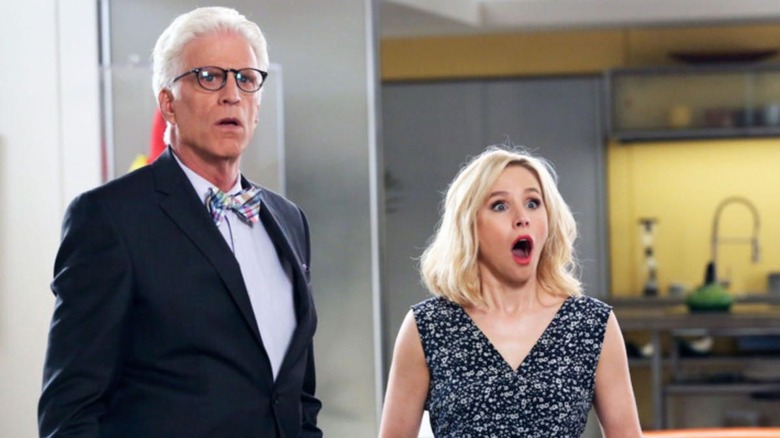
For many people, myself included, "The Good Place" became a haven in a world growing increasingly more depressing and nihilistic. The show ended in January of 2020, right before the pandemic would change all of our collective lives, but its accessibility was a literal lifeline once we were trapped indoors with nothing to do but be scared and binge-watch. I can only speak from my own perspective, but "The Good Place" restored my faith that people are and have the potential to be, well, good.
In the show's final two seasons, "The Good Place" offered a message of comfort that I don't think many knew was exactly what they needed. The idea of obtaining a perfect existence on Earth is impossible, because human existence is too complicated and nuanced to possibly ever make everyone happy in any given situation. Lesser comedies are quick to say things like "everyone's offended about something these days," but "The Good Place" takes the well-rounded and mature route by acknowledging that there's no such thing as a flawless choice, which means screwing up is inevitable. We're all just idiots trying our best and there's just as much worth in our attempts as in our successes.
As Michael so expertly says in the final season, "What matters isn't if people are good or bad. What matters is, if they're trying to be better today than they were yesterday. You asked me where my hope comes from? That's my answer."
How Does The Good Place End?
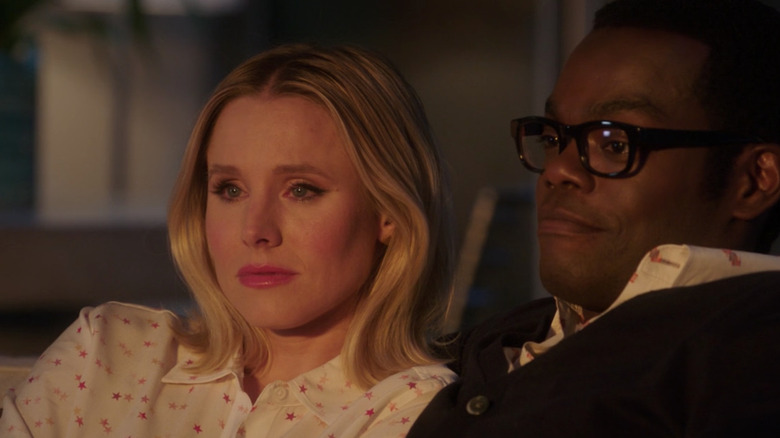
After our core four humans decide how they will spend the rest of their eternities, the show pivots their attention to Michael, who has been given the chance to become a human and learn more about the species he's become so fascinated by. His time on Earth is about as human as it can get. He celebrates a New Year's Eve countdown, he burns his hand cooking food, he learns to play guitar, and he lies about how far away he is when texting a friend. Michael Realman becomes real, man.
After Eleanor walks through the door into oblivion, a twinkling speck of her falls to Earth and lands on the shoulder of a stranger who just threw out a piece of Michael's mail. The speck inspires him to dig out the mail and return it to its rightful owner. Michael thanks the man who replies, "Take it easy."
Michael then ends the episode with a callback to a scene from the first season where he mourned all the human experiences he'd never get to have as a demon and says, "I'll do you one better." He continues, "I'll say this to you, my friend, with all the love in my heart and all the wisdom of the universe: Take it sleazy."
The Good Place Ending Explained
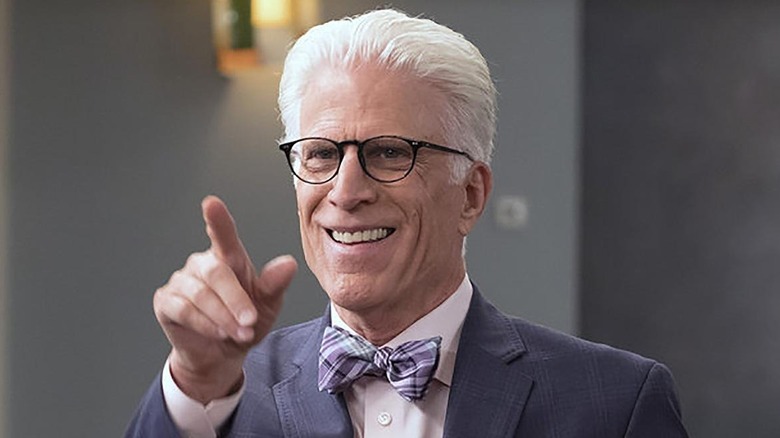
Eleanor's spirit may have dropped on this perfect stranger, but "take it sleazy" is the perfect way to honor both her memory and showcase the impact she had on Michael's existence. Eleanor's afterlife was spent learning how to become the best possible version of herself, but she never lost what made her special. No amount of philosophy could erase her personality or an undying love of Stone Cold Steve Austin (or men that look like Stone Cold Steve Austin).
The first time we saw Eleanor turning a new leaf for the unselfish, she was returning a wallet to a stranger at a bar. This event is what sparked the chain reaction of Eleanor's progress to be worthy of the Good Place, including her final act of selflessness in helping Michael get the chance to be human. "Take it sleazy" isn't just cute advice, it's a thank you to the kind-hearted mess who helped make him human. In a show that focuses so heavily on big themes and deep meaning, it ends on something so simple. It's the perfect ending to a show that teaches us perfection should never be the goal and if you'll excuse me, I'm going to go cry about it again.
Read this next: The Radical Generosity Of 'The Good Place' Made It One Of The Greatest Modern TV Shows
The post The Good Place Ending Explained: Take it Sleazy appeared first on /Film.
0 Commentaires